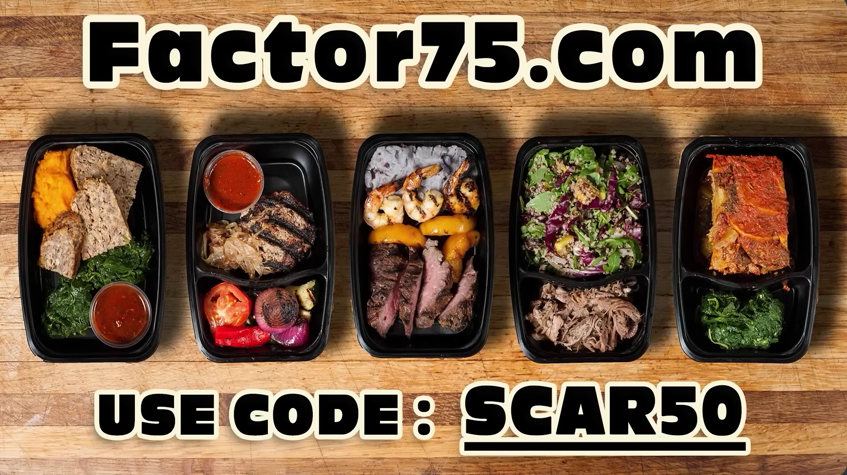(This image is a screencap from a portion of the advert in the video)
This assignment proved a bit difficult, because during the summer of 2024, Canada’s Competition Act added new laws that target greenwashing in Canadian advertising media. Another reason why I struggled with this assignment was because I often do not pay attention to advertising. With advertising being everywhere and being around us at all times, we often tune it out because it is just extra noise in our environments. However, when I was watching a YouTube video from a YouTuber by the name of Scar, he made that video with a sponsored segment in the middle of his video promoting a meal delivery brand called Factor. Within YouTube videos now, some companies will contact creators and ask to sponsor their videos; the company pays the creator to showcase a product in their video. In this sponsored segment, Scar is shown opening and preparing the meals that Factor offers.
The advertisement shows that Factor meals are easily prepared, healthy, and perfect on days where you might be too busy to cook. This is indicated by how Scar is very busy making videos and taking care of his two new cats; he literally and figuratively has his arms full. He then shows how easy it is to prepare the meals: all he has to do is take off the film, put them in his toaster oven to cook, take them out, and put the meals on plates. The advertisement takes place during the day, as you can see sunlight shining through the windows of Scar’s house. The advertisement also has very warm and natural lighting, which makes it feel more cosy and honest. The focus in this advertisement is on the food, with the background becoming more blurry in many of the shots. Near the end of the advertisement, you can also see Scar setting the table with the meals that he cooked, which can remind the viewer about times where you would sit down at the dining table and enjoy dinner with your family.
In my research, I found that Factor is actually owned by the company HelloFresh. Both companies are similar in what services they deliver; fresh food delivery to enjoy meals at home. The only difference in service between the two is that Factor delivers meals that have to be heated up, while HelloFresh delivers the ingredients for a meal, and you still have to prepare the meals yourself with a HelloFresh kit. One key thing I noticed in this sponsored segment was how Scar mentioned that Factor was a sustainable choice, and that “Factor offsets 100% of its delivery emissions and sources 100% renewable electricity for their production sites and offices”. However, in the advert, we see Scar unpacking a meal in a plastic container, with a plastic film covering the meal. This made me curious about if the packaging that Factor and HelloFresh uses was actually sustainable, or if it was greenwashing the audience about the real sustainability of their products.
After some research, I found that sustainability seems to be quite a high priority for HelloFresh. They claim that their meals help reduce food waste, due to having proportioned ingredients. The food they use is also said to come from local suppliers, so it reduces the emissions from shipping food. It has also been suggested that meal-kit services like HelloFresh produce less greenhouse gases than cooking with groceries bought from a store.
However, when they were at the height of their popularity, HelloFresh faced public backlash about the use of plastics in their packaging. While the company was not able to go plastic-free, they are instead working to develop more sustainable packaging, and they also try to inform customers of the other sustainable actions they are taking. According to HelloFresh’s website, their current meal packages are “made from post-consumer recycled fibres and are 100% recyclable” and they continue to reduce the amount of packaging they use. With how HelloFresh owns Factor as a smaller company they run, I assume they use the same packaging methods for the prepared meals as well.
Overall, while HelloFresh has faced complaints about their plastic use, they appear to be trying to correct that error and make their product more sustainable. As of now, there is little to no evidence of them greenwashing their product to customers. Both HelloFresh and Factor seem to be genuine about their efforts to be eco-friendly and sustainable, and with Scar making the sponsored advertisement about Factor, it seems that he thought they were an honest company and decided to showcase them on his YouTube channel.
Bibliography
HelloFresh. “About Us.” Accessed September 28, 2024. https://www.hellofreshgroup.com/en/
GoodTimesWithScar. 2024. “The Last Build! – HermitCraft Episode 26!.”
September 15, 2024, YouTube video, 6:21-7:51, https://www.youtube.com/watch?v=c6xuQj2eFjk&t=445s
Heard, Brian et al. “Comparison of life cycle environmental impacts from meal kits and grocery
store meals.” Resources, Conservation, and Recycling 147, no.19 (2019): 189-200. https://doi.org/10.1016/j.resconrec.2019.04.008
HelloFresh. “Innovative Packaging.” Accessed September 27, 2024.
https://www.hellofresh.ca/about/packaging?locale=en-CA
Government of Canada. “Public Consultation on Competition Act’s New Greenwashing
Provisions.” Accessed September 25, 2024. https://competition-bureau.canada.ca/how-we-foster-competition/education-and-outreach/public-consultation-competition-acts-new-greenwashing-provisions
Sharda, Nikita et al. “HelloFresh: Transitioning to a plastic-free future.” International Food and
Agribusiness Management Review 27, no.2 (2024): 378-396. https://doi.org/10.22434/ifamr2023.0068
HelloFresh. “Sustainability at HelloFresh.” Accessed September 27, 2024.
https://www.hellofresh.ca/about/sustainability


Edgardo
The student at the beginning of their essay explained why the assignment was difficult due to new Canadian policies. After that, the student went on to analyze the advertisement video from a technical point of view by diving into the colouring, lighting, and scenery used to describe the intent of the advertisement. Consequently, they found out that Hellofresh is the parent company of Factor and used a quote in the ad talking about how Factor is using renewable energy and offsetting carbon emissions in deliveries. Afterwards, they pondered about the plastic shown in the ad and investigated if the plastic used by the company for their wrapping was sustainable. Their research found that the plastics used are sustainable according to the information provided by Hellofresh after having controversies about them in the past. Finally, they gave their opinion about the company being honest and genuine with their efforts for sustainability.
The student writing this essay does little to describe the concept of greenwashing. Yet, it does analyze the greenwashing in the company, as they researched slightly the plastic used.
I think the students missed out on the chance to investigate or follow through with the quote they brought out of the script of the advertisement about energy and greenhouse gases. Because as it stands out right now it feels a bit confusing and out of place that quote as it leads to no exploration. Additionally, I’m not sure how productive and organized it was to write about the complications of writing the essay.
The essay sadly also fails to use correct citations throughout the essay as they can utilize quotes but don’t put indications where they grabbed them from, so just adding in-text citations could help to know where the ideas are coming from.
-Edgardo